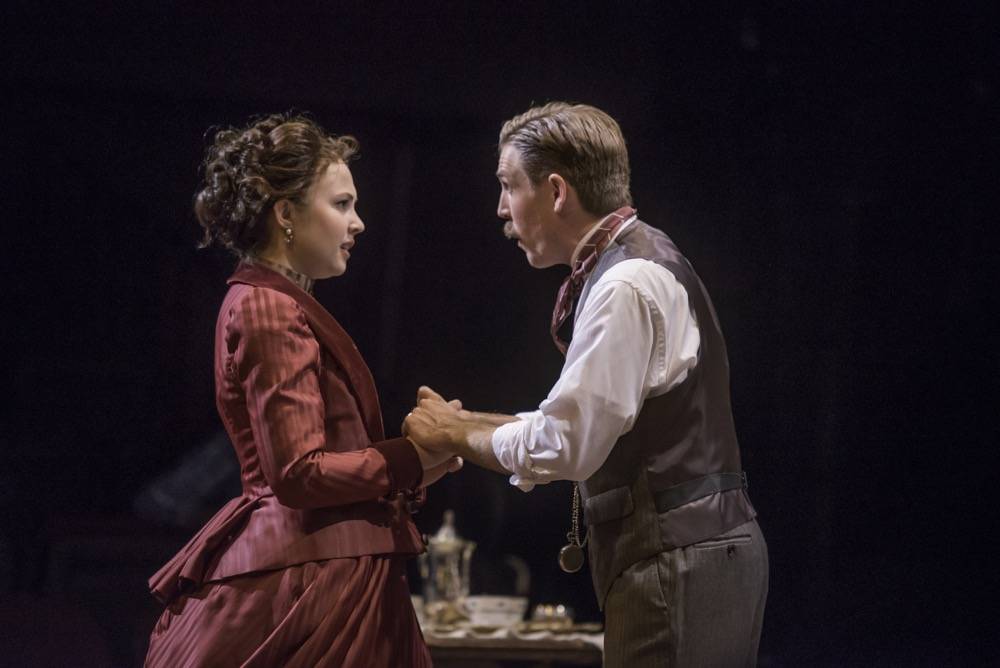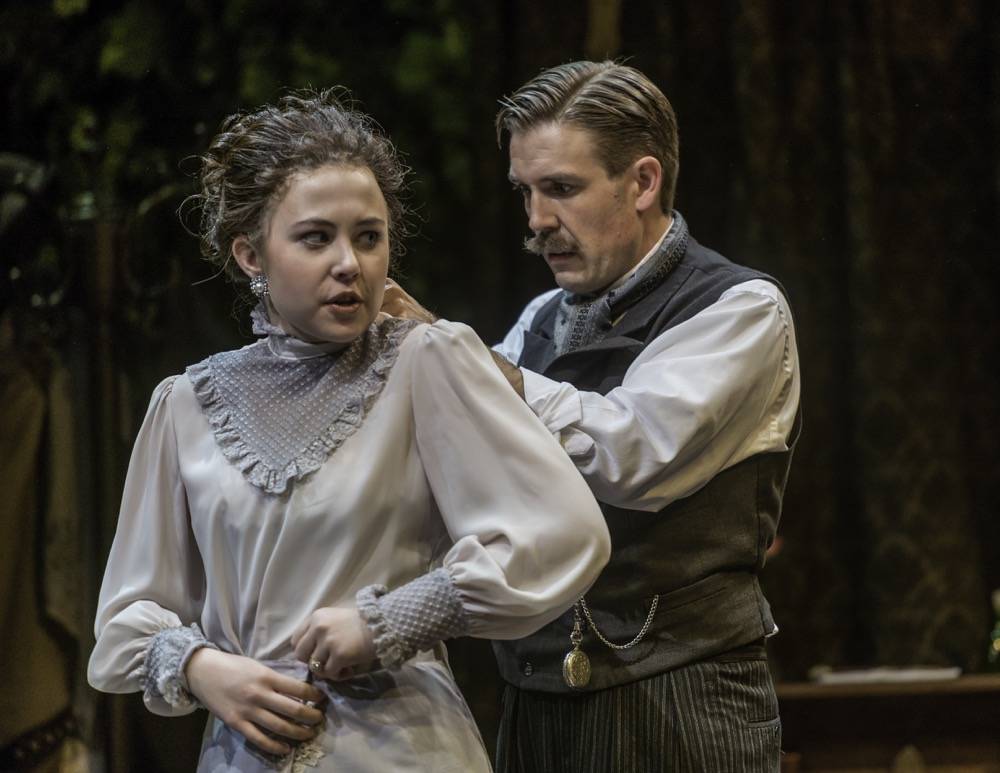Endearing, hilarious, heart-wrenching are just a few words to describe the production of In the Next Room, or the vibrator play at the Krannert Center for the Performing Arts’ Studio Theatre. But before delving deeper into the play, I will admit that, as a man, my understanding of these women’s experiences is limited. I can understand the historical and social implications the content, but I will never be able to experience what these women, or women today, must struggle against in a patriarchal society.
Directed by Lisa Gaye Dixon, and set against a backdrop of Victorian era sensibilities which — not unlike modern conventional society — lifts up men’s sexual desires and demonizes women’s (along with autonomy, breastfeeding, womanhood, etc), In the Next Room highlights men’s refusal to see or understand the possibility of women existing outside of the confines created by the extant patriarchy. And while the content of the play, at its core, focuses on a penultimate moment in women’s sexual revolution there is so much more.
Women beginning to escape the confinements of patriarchy — a task that is still made difficult because of the same cluelessness and unwillingness to relinquish power. An acknowledgement of women’s pleasure, and women claiming the autonomy they deserve in finding the pleasure they desire and where they want to find it. Most of all, the undercurrent of insecurities, desperation to find one’s true self, and the desperation to truly connect with the one person that claims to love you the most. This is all presented in a beautifully wrapped package of an incredible set and costumes, expert direction, and a talented cast.
Greeted immediately by an intricate and beautiful set, the audience finds themselves transported directly into Dr. and Catherine Givings’ home. The floor painted and stained like hardwood — a fantastic paint job that fooled me — gorgeous furniture, and authentic props from drapery all the way to the tea set. And of course elegant, beautiful costumes. Kira Lyon (prop master), Yue Shi (scenic designer), and Nicole Zausmer (costume designer) all should be lauded for their ability to pull back the curtain of time and offer us a brief peek into the past.
No matter how swept up in the set I found myself, though, even better was the direction by Dixon and the performance by the cast.
The moment Ellen Magee (Catherine Givings), Elana Weiner-Kaplow (Sabrina Daldry), and Jordan Coughtry (Dr. Givings) step on stage and speak their first lines, it is clear how deeply engaged they are with their characters.
Magee is a star in the making. I absolutely loved the quirkiness with which she interpreted Catherine. This quirkiness, however, quickly gave way to show a woman wrestling with her own self; a walking cognitive dissonance of sorts. Magee showed this aspect of Catherine with flawless skill. In fact, it was quite beautiful how Magee danced from Catherine’s curiosity and love for life to her pain over her struggles to breastfeed her daughter to her utter brokenness of losing the connection with her husband. I would argue that Magee’s Catherine who struggles with claiming her place in the world and understanding herself through her own personal strife is a character to whom most of us can relate.
Elana Weiner-Kaplow’s performance as the endearing and hilarious Sabrina Daldry should not be forgotten. While Daldry’s character presented a large amount of the play’s comedic relief. She, quite successfully, portrays a woman emblematic of those who finally find the courage to rediscover themselves and step out of the confinements of Victorian sensibilities. As Daldry began to rediscover herself and open up to who she could be, so did Weiner-Kaplow’s performance. By lights down, Weiner-Kaplow became a bright light in a rather dim struggle for true connection with self and with others.
Coughtry, very successfully, portrayed a man who, broken by insecurity and an inability to help his own wife, throws himself into helping other women. He, as Givings, masterfully demonstrates a building frustration in himself; a frustration that he as clueless to as his own wife’s struggles. A man who claims “dry, boring science” is not appropriate for a wife who desperately wants to connect. Or a man who cluelessly claims that “men’s intellect keep them from seeing.” Givings, sir, you must have such incredible intellect.
This is all to say that Coughtry convincingly played a man so incredibly insecure in his marriage he’d rather sweep all the issues under the rug, and ignore them.
Ryan Luzzo’s portrayal of painter Leo Irving was sublime. Although he came across as melodramatic at first, I soon realized such an interpretation was perfect for the artistic type of the time: a man that did not fit within the box men were forced into during the era. His performance represented the greater desire of others to move beyond what they were used to, and on to a life filled with experiences worth savoring.

If there was anything I was unhappy with, it would be Nick Lannan as Mr. Daldry and Jacklyn Ovassapian as Annie. Both are talented, but their performances seemed to get lost in everything else. While Lannan effectively portrayed a man stuck in his ways, he appeared trapped in his own mind and focused far too much on executing the character rather than letting the performance happen naturally. In regards to Ovassapian as Annie, she had especially poignant moments with Weiner-Kaplow as a hand that guided her through self discovery, but it was her performance that made Annie enjoyable more than the character herself.
Most of my favorite moments were not the moments of intense drama, or the moments filled with hilarity, but the subtle and intimate scenes in which Magee and Maya Prentiss (Elizabeth) shared a stage. Both, struggling with motherhood for far different reasons, these are moments in which we see pain come to light. Prentiss plays Elizabeth with a stoicism that, at times, slips to unveil a woman barely holding herself together after losing her infant son. I believe it these moments where, even while taking the brunt of Catherine’s jealousy over her daughter taking to Elizabeth as a wet nurse, Elizabeth provides a means for Catherine to find new strength as a woman within herself. Catherine would not be who she was by the end of the story without Elizabeth. Elizabeth would not have been Elizabeth without Maya Prentiss.
Another of my favorite moments comes when tension in the Givings marriage has built and built until we witness what appears to be a breakthrough. Dr. Givings attempts to communicate at a deeper level, albeit still through the lens of electricity and science, by asking Catherine which current of electricity she prefers: AC or DC. Catherine responds by saying “DC. Direct connection.” Then in a hopeful and heartbreaking moment between Coughtry and Magee, all is said in a few moments of silence. Catherine desperately pleads for her husband to understand the connection she is longing for. For a split second it seems the current has finally reached Dr. Givings, but per usual it is the one current he cannot comprehend. He walks off, proclaiming he didn’t expect her answer, and in that moment I wanted to storm on stage and shake sense into him. Yet this moment displayed the chemistry between Coughtry and Magee more than any other moment. More than the manner in which they interact and play off each other as though their conversations are snippet of everyday life (which I adore). Their use of silence, of quiet visceral moments in which their brokenness and vulnerability are poured out for all to see, was breathtaking. The same is true as we reached the final scene. The direct connection so deeply desired by Catherine has finally come to fruition, and as they undress in the winter garden they finally see each other with all barriers removed.
It is my belief that all truly well written comedies present both sides of life; both sides of the coin if you will. On the one hand life is filled with joy, laughter, and pleasure. But on the other, life is filled by just as much drama, pain, and struggles. A truly great comedy does not hesitate to put the jokes aside for a moment to engage the reality of life. In the Next Room, especially considering the performance of the cast, does exactly that in such an exquisite fashion.
Trekking through a cold, Midwestern is worth the three hours of warmth and joy offered by this production.
In the Next Room (or The Vibrator Play) opened October 26th and runs various dates until closing on November 5th. Check out the Krannert Center website for tickets and dates.
Photos courtesy of Krannert Center.








